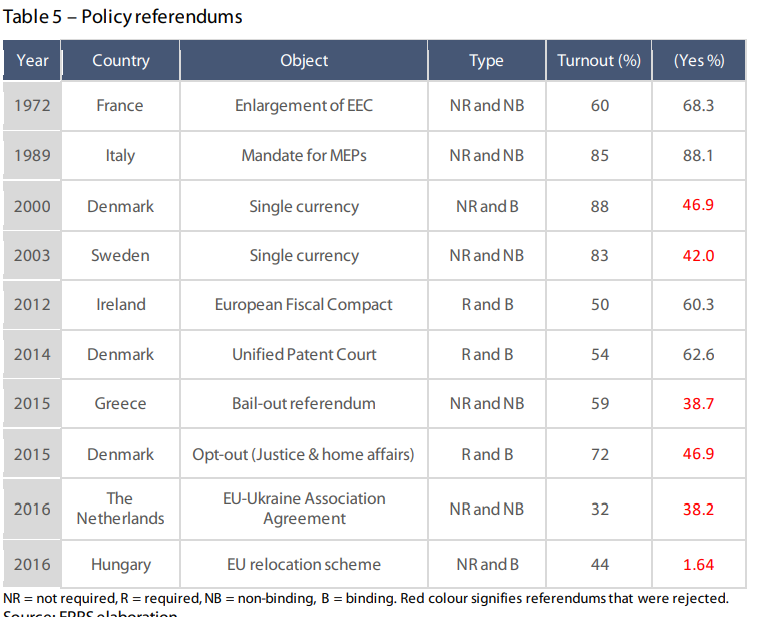
Вярно ли е, че България е единствената страна, която не е провела референдум за присъединяване към Европейския съюз (ЕС) и еврозоната? Не, не е вярно: Единадесет държави-членки не са провеждали референдум за членство в ЕС. Девет от 20-те страни в еврозоната, включително Германия, Белгия и Италия, приеха еврото без специално проведен за целта референдум. Има и държави, които проведоха референдум за договори, които включват разпоредби за членство в еврозоната. България обсъди провеждането на референдум за еврозоната, но той беше отхвърлен от парламента.
Твърдението се появява в ТикТок видео (архивирано тук), публикувано на 2 март, 2024 г., със следното заглавие:
България е единствената страна, в която не са проведени референдум за влизане в ЕС или в еврозоната
Ето как изглежда публикацията в ТикТок към момента на писане:

(Източник: ТикТок екранна снимка, направена в сряда, 6 март, 20:28:03 2024 UTC)
В социалните мрежи (архивирано тук и тук) се разпространява невярното твърдение, което гласи, че България е единствената страна, която не е провела референдум за членството си в ЕС и еврозоната. Това изявление вменява идеята, че мнозинството от страните членки са провели национални референдуми за присъединяването си към ЕС и еврозоната.
Докладът (архивирано тук) „Референдуми по въпросите на ЕС", публикуван от Службата на Европейския парламент за парламентарни изследвания през април 2022 г., показва, че България не е единствената страна-членка на ЕС, която не е провела референдум за присъединяване към ЕС или еврозоната, тъй като има и други държави, в които това не се е случило. Във въведението към доклада, преведен от английски на български от екипа на Lead Stories, се казва:
От 1972 г. в Европа са проведени 58 референдума по въпроси на ЕС, свързани с членство, ратифициране на договори или конкретни политически въпроси (напр. приемане на еврото). [...] Въпреки повишения интерес в някои държави, референдумите остават спорни. От една страна, привържениците на пряката демокрация подчертават ролята им за ангажиране на гражданите, подобряване на легитимността и приобщаващо управление. От друга страна, критиките подчертават техните недостатъци, като критиците по-конкретно смятат, че след отхвърлянето на Конституционния договор от Франция и Нидерландия през 2005 г., избирателите са склонни да отговарят на въпроси, различни от тези в бюлетината на референдумите.
Докладът подчертава, че референдумите за членство представляват по-голямата част от референдумите, свързани с ЕС, с 24 от 58 проведени, седем от които са се състояли в Норвегия, Швейцария и Лихтенщайн. Също така, на страница 12 се казва, че:
референдуми за членство никога не са провеждани в 11 държави-членки (Белгия, България, Кипър, Франция, Германия, Гърция, Италия, Люксембург, Нидерландия, Португалия, Испания).
Девет държави от еврозоната (архивирано тук), включително Германия, Белгия и Италия, са приели еврото, без да провеждат специален за целта референдум. Тези страни са приели еврото като тяхна единствена валута на 1 януари, 1999 г. (архивирано тук), първоначално в електронен вид. Гърция (архивирано тук) последва техния пример на 1 януари 2001 г., точно преди физическите евромонети и банкноти да заменят националните валути в еврозоната.
Договорът от Маастрихт (архивирано тук), подписан през 1992 г., положи основите за приемането на еврото от държавите-членки на ЕС. Има още шест държави, които са задължени да въведат еврото според договорите им с ЕС, след като изпълнят необходимите критерии: България, Чехия, Унгария, Полша, Румъния и Швеция. Сред тях само България в момента участва в Eвропейския механизъм за валутните курсове (ERM II) (архивирано тук), като предпоставка за приемане на еврото. Приемане на еврото в тези държави зависи от тяхната готовност и покриване на тези критерии.
Единствените държави, които са провели референдум за единната валута на ЕС, са Дания и Швеция. През 2000 г. мнозинството от датските избиратели гласуваха против присъединяването на Дания към еврозоната. През 2003 г. Швеция също гласува против присъединяването към единната валута:

(Източник: Доклад на Европейския парламент за референдумите по въпросите на ЕС (архивирано тук), стр.24, екранна снимка, направена в сряда, 6 март 22:39:33 2024 UTC)
Първоначално през 1992 г. Дания отхвърля Договора от Маастрихт, с който е създаден Икономическия и паричен съюз, и след това договоря четири изключения (архивирани тук), включително едно за еврото. Страната провежда още един референдум за присъединяване към еврото през 2000 г. (архивирано тук), но предложението отново е отхвърлено. Швеция се присъединява към ЕС през 1995 г., приемайки задължението да приеме еврото, но провежда референдум по въпроса през 2003 г., който води до отхвърлянето му от мнозинството (архивирано тук). Швеция не се е присъединила към валутния механизъм ERM II, който е предпоставка за присъединяване към еврозоната (архивирано тук).
През юли 2023 г. българският парламент отхвърля (архивирано тук) проектопредложение на крайнодясната партия Възраждане (архивирано тук) за провеждане на референдум, който да отложи влизането на България в еврозоната с двадесет години. През февруари 2024 г. българският Конституционен съд също отхвърля (архивирано тук) инициативата за провеждане на референдум. Въпреки тези откази, въпросът остава тема на дебат и интерес в България.
















